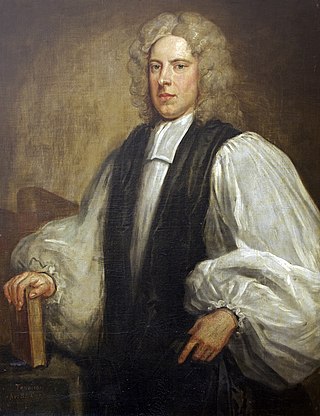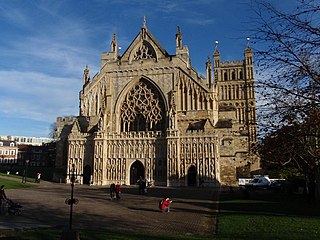Related Research Articles

John Whitgift was the Archbishop of Canterbury from 1583 to his death. Noted for his hospitality, he was somewhat ostentatious in his habits, sometimes visiting Canterbury and other towns attended by a retinue of 800 horses. Whitgift's theological views were often controversial.

Richard Cox was an English clergyman, who was Dean of Westminster and Bishop of Ely.
The Regius Professorships of Divinity are amongst the oldest professorships at the University of Oxford and the University of Cambridge. A third chair existed for a period at Trinity College Dublin.

Roger Northburgh was a cleric, administrator and politician who was Bishop of Coventry and Lichfield from 1321 until his death. His was a stormy career as he was inevitably involved in many of the conflicts of his time: military, dynastic and ecclesiastical.

The Dean of St Patrick's Cathedral is the senior cleric of the Protestant St Patrick's Cathedral, Dublin, elected by the chapter of the cathedral. The office was created in 1219 or 1220, by one of several charters granted to the cathedral by Archbishop Henry de Loundres between 1218 and 1220.

John Overall (1559–1619) was the 38th bishop of the see of Norwich from 1618 until his death one year later. He had previously served as Bishop of Coventry and Lichfield, as Dean of St Paul's Cathedral from 1601, as Master of Catharine Hall from 1598, and as Regius Professor of Divinity at Cambridge University from 1596. He also served on the Court of High Commission and as a Translator of the King James Version of the Bible.
Jonathan Michael Gledhill was an English Anglican clergyman. He was the Bishop of Southampton from 1996 to 2003, and the 98th Bishop of Lichfield from 2003 to 2015.
Richard Sampson was an English clergyman and composer of sacred music. He was an Anglican bishop of Chichester, and subsequently of Coventry and Lichfield.

St Dionis Backchurch was a parish church in the Langbourn ward of the City of London. Of medieval origin, it was rebuilt after the Great Fire of London to the designs of Christopher Wren and demolished in 1878.

Godfrey Goldsborough was a Church of England clergyman and Bishop of Gloucester from 1598 to 1604. He also served as a Prebendary of Worcester.

John Warner was an English churchman, Bishop of Rochester and royalist.
Alistair James Magowan is a British retired Anglican bishop. He served as the Bishop of Ludlow — the sole suffragan bishop of the Church of England Diocese of Hereford — from 2009 until his 2020 retirement.
Robert Steward was an English cleric who served as the last prior of the Benedictine Ely Abbey, in Cambridgeshire, and as the first Dean of Ely Cathedral which replaced it at the Dissolution of the Monasteries.

The Dean of Lichfield is the head and chair of the chapter of canons, the ruling body of Lichfield Cathedral. The dean and chapter are based at the Cathedral Church of the Blessed Virgin Mary and St Chad in Lichfield. The cathedral is the mother church of the Diocese of Lichfield and seat of the Bishop of Lichfield. The Deanery has been vacant since Adrian Dorber's retirement in 2023, but will filled when the interim dean, Jan McFarlane, is installed as permanent dean on 21 September 2024.
Robert de Stretton was Bishop of Coventry and Lichfield following the death of Roger Northburgh in 1358. A client of Edward, the Black Prince, he became a "notorious figure" because it was alleged that he was illiterate, although this is now largely discounted as unlikely, as he was a relatively efficient administrator.
George Pellew (1793–1866) was an English churchman and theologian, Dean of Norwich from 1828 to 1866.

Edward Tenison (1673–1735) was an English bishop of Ossory. An example of the workings of the system of patronage in the Church of England, Tenison also was a significant Whig and controversialist.

Thomas Boleyn, LL.B, , was the Master of Gonville Hall, Cambridge from 1454 to 1472, the seventh to hold that position. During the later 1440s, through three separate acts of foundation, he was one of the small group appointed to formulate the statutes of what became Queens' College in Cambridge. His brother Sir Geoffrey Boleyn, Lord Mayor of London 1457-58, was the great-grandfather of Anne Boleyn, Queen consort of England.
Henry Carpenter D.D. (1606–1662) was a Canon of Windsor for a short period in 1662.

Nicholas Marston was a 16th century English priest. It is uncertain whether his appointment as Archdeacon of Cornwall in 1574 took effect. He was one of three brothers, who had ecclesiastical careers in the Cathedral church of Exeter, and in that diocese within Cornwall and Devon. Their father was a wealthy citizen Haberdasher in the city of London who gave financial support to the early career of his wife's brother William Bradbridge, later bishop of Exeter. Thomas's daughters made advantageous City marriages, and the network of their mercantile patronage and relations with the bishops, deans and chapters of Exeter and of Bath and Wells, and with the University of Oxford, spanned several decades of the Tudor and early Stuart period.
References
 This article incorporates text from a publication now in the public domain : Bullen, Arthur Henry (1886). "Boleyn, George (d.1603)". In Stephen, Leslie (ed.). Dictionary of National Biography . Vol. 5. London: Smith, Elder & Co.
This article incorporates text from a publication now in the public domain : Bullen, Arthur Henry (1886). "Boleyn, George (d.1603)". In Stephen, Leslie (ed.). Dictionary of National Biography . Vol. 5. London: Smith, Elder & Co.
- Fox, Julia (March 2008). Jane Boleyn: The True Story of the Infamous Lady Rochford . Toronto: McClelland & Stewart. ISBN 978-0-7710-4776-3.